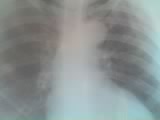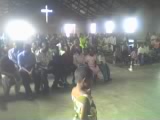




SENSITIZATION OF WOMEN AT KAHEMBE HEALTH CENTER, March 19, 2011: EVENT REPORT
Cervical cancer screening: a method to prevent cervical cancer in 100% in our community.
I. Introduction
Cervical cancer is the leading cause of death by cancer in DRC, so screening and treatment of precancer is more important for women in DRC. After the training of health professionals held from January 8-9, 2011, we have to conduct sensitization campaign for the adherence of women to the program. Three sessions are planed for this campaign and this is the third session held in March 19, 2011 to sensitize women and take their commitment to be involved in cervical cancer prevention campaign and to take the test.
II. Duration of the event: 2 hours (08:00-10:00)
III. Objectives:
1. To Sensitize 20 women (who bring children to vaccination séance and who come to prenatal examination) on cervical cancer screening relevance for women and take their commitment to accept the test.
2. To give to all women who receive the message on cervical cancer screening relevance, the leaflets detailing all methods of cervical cancer prevention.
3. To mount a poster at the entry of the Health Facility carrying the message: Cancer can be prevented too
Cervical cancer screening and vaccination are very important for
women and young girls. Come for screening to this health center.
IV. Outcomes:
The total number of attendees was: 35 women.
At the end of the event:
1. Thirty five (35) women in the city of Goma/Kahembe (Birere) quarter were sensitized on cervical cancer screening relevance and 100% of them have committed to take the test.
Indicator1: 35 women have attended the event/20 expected= 175%.
2. Thirty five (35) women in the city of Goma/Kahembe quarter were sensitized on cervical screening relevance and 100% of them have received leaflets detailing cervical cancer prevention methods.
Indicator1: 35 women who attended the event have received leaflets/35 expected= 100%.
3. A poster has been mounted at the entry of the Health Facility carrying the expected message well readable. Indicator: 1 poster at the entry with the message/1 expected= 100%.
V. Other outcomes
1. All attendees have committed to raise awareness of their neighbors on tobacco smoking and cancer prevention using information in the leaflets given to them during the event.
2. All attendees have committed to raise awareness of their friends and members of family on cervical cancer screening and treatment to allow them adhering to the program.
3. All attendees have received the message that tobacco is a big health issue and must be fighted strongly.
VI. Organizing team:
1. Mateus Kambale Sahani, M.D: Manager and speaker
2. Pele Nzanzu Kikuhe, M.D: Speaker
3. Alphonse Paluku Kavwirwa, organizer.
4. Tshombe Desire, Moderator (nurse).
5. Mrs. Tungu Kahamwiti: speaker (nurse).
Recommendations
At the end of the event, attendees have given these recommendations:
-To look for financial support for the availability of cryotherapy and for the effectiveness of the screening. This will avoid long distance for women looking for cryotherapy,
-To distribute more leaflets to other women to allow them being aware of this program and then they can be stimulated to go to screening service.
-To support the Health Centers with materials for screening.
Done in Goma,
April 11, 2011.
Mateus Kambale Sahani, M.D.
AGIR ENSEMBLE-HEALTH DEPARTMENT.






































































































































